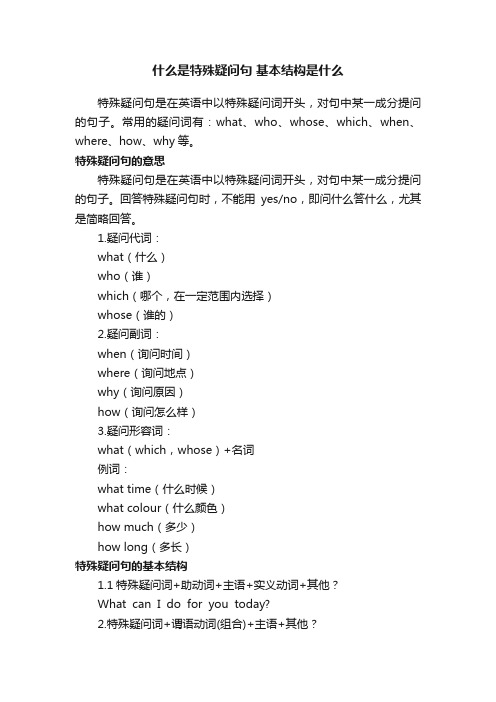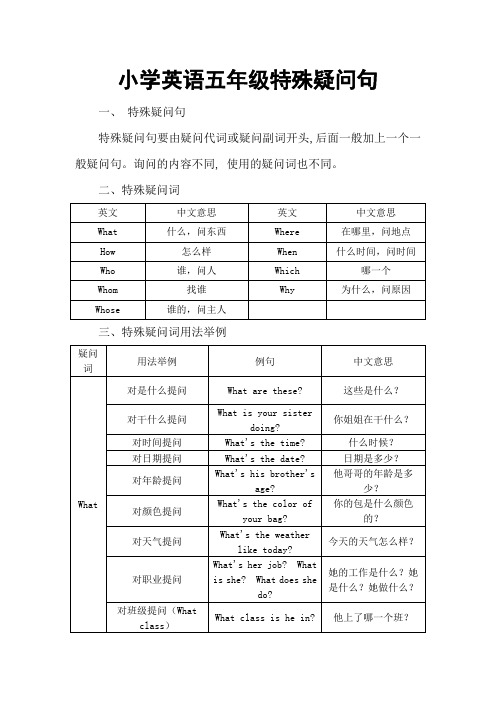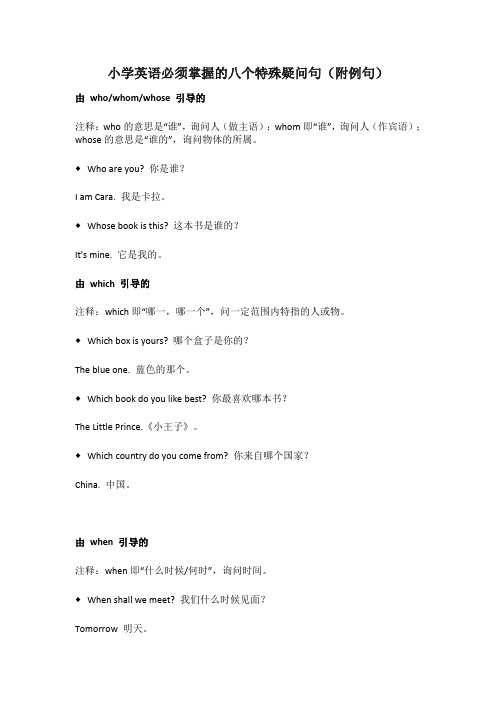英语特殊疑问句
英语特殊疑问句知识点总结及练习(含答案)

英语特殊疑问句知识点总结及练习特殊疑问句基本概念:通常以特殊疑问词开头,对句中某一成分提问的句子叫特殊疑问句。
常用的疑问词有:what who whose which when where how why等。
可大致分为3种:(简单了解)疑问代词:what,who,which,whose,whom疑问副词:when,where,why,how疑问形容词:what(which,whose)+名词特殊疑问句有两种语序:1.如疑问词作主语或主语的定语,即对主语或主语的定语提问,其语序是陈述句的语序:疑问词(+主语)+谓语动词+其他成分.如:- Who is singing in the room?- Whose bike is broken?2.如疑问词作其他成分,即对其他成分提问,其语序是:疑问词+一般疑问句语序?如:- Which class are you in?- What does she look like?- Where are you from?- What time does he get up every morning?- How do you know?特殊疑问句的回答:1.回答特殊疑问句时,不能用yes / no,即问什么答什么,尤其是简略回答。
如:- Who is from Canada?- Helen (is).- Where's the restaurant?- Near the station.- Why do you like koalas?- Because they are cute.2.特殊疑问句一般读降调(↓)。
一、由what引导的注释:what即“什么”,属于高频使用的特殊疑问题。
(一) What + 系动词 + sb/sth?1、询问“是什么”What's that? It's an apple.那是什么?那是一个苹果。
What's it in English? It's an orange.它用英语怎么说?它是一个orange。
什么是特殊疑问句基本结构是什么

什么是特殊疑问句基本结构是什么
特殊疑问句是在英语中以特殊疑问词开头,对句中某一成分提问的句子。
常用的疑问词有:what、who、whose、which、when、where、how、why等。
特殊疑问句的意思
特殊疑问句是在英语中以特殊疑问词开头,对句中某一成分提问的句子。
回答特殊疑问句时,不能用yes/no,即问什么答什么,尤其是简略回答。
1.疑问代词:
what(什么)
who(谁)
which(哪个,在一定范围内选择)
whose(谁的)
2.疑问副词:
when(询问时间)
where(询问地点)
why(询问原因)
how(询问怎么样)
3.疑问形容词:
what(which,whose)+名词
例词:
what time(什么时候)
what colour(什么颜色)
how much(多少)
how long(多长)
特殊疑问句的基本结构
1.1特殊疑问词+助动词+主语+实义动词+其他?
What can I do for you today?
2.特殊疑问词+谓语动词(组合)+主语+其他?
What is your name, please?
3.特殊疑问词(主语)+助动词+实义动词+其他?
Who will go to Guangzhong with the manager by plane tomorrow?
4.特殊疑问词(主语)+谓语动词(组合)+其他?
Who is the man under the big tree?。
小学英语五年级特殊疑问句

小学英语五年级特殊疑问句一、特殊疑问句特殊疑问句要由疑问代词或疑问副词开头,后面一般加上一个一般疑问句。
询问的内容不同, 使用的疑问词也不同。
二、特殊疑问词三、特殊疑问词用法举例四、疑问词填空练习【牛刀小试】1.( ) do you like?2.( ) many birds do you see?3.( ) is that man?4.( )can you do ?5.—( ) your name?—My name’s Amy.6.—( ) this/that?—It’s a bear!7.—( ) do you like?—I like watermelons.8.—( ) in the classroom?—One blackboard, one TV, many desks and...—It’s blue and white.10.—( )would you like for dinner?—I’d like some beef and noodles.11.—( )your father’s job?—My father is a doctor.12.—( )time is it?—It’s 9 o’clock.13.—( ) the weather like in London?—It's rainy.14.—( ) are these/those?—They are tomatoes.15.—( )are you?—I’m fine. Thank you./ Very well. Thanks. 16.—( )old are you?—I’m twelve years old.17.—( ) many kites do you see/have?—I see/have ten kites.18.—( ) many people are there in your family? —Nine.19.—( ) much is it?—It’s 89 dollars.—I’m from the USA. 21.—( ) is my car?—It’s under the chair. 22.—( )is it?—It’s near the window.’23.—( ) is the library? —It’s on the second floor.24.—( )is that boy?—He is my brother. 25.—( )is he?—He is Zhang Peng. 26.—( )coat is it?—It's your father’s. 27.—( )are these? —They are mine.28.( )is the crayon?—It's in the pencil box. 29.( ) is that girl? ---She is my sister .。
小学英语必须掌握的8个特殊疑问句(附例句)

小学英语必须掌握的8个特殊疑问句(附例句)1、由who/whom/whose 引导的注释:who的意思是“谁”,询问人(做主语);whom的意思是“谁”,询问人(作宾语);whose的意思是“谁的”,询问物体的所属。
◆Who are you? 你是谁?I am Cara. 我是卡拉。
◆Whose book is this? 这本书是谁的?It’s mine. 它是我的。
2、由which 引导的注释:which即“哪一,哪一个”,问一定范围内特指的人或物。
◆Which box is yours? 哪个盒子是你的?The blue one. 蓝色的那个。
◆Which book do you like best? 你最喜欢哪本书?The Little Prince.《小王子》。
◆Which country do you come from? 你来自哪个国家?China. 中国。
3、由when 引导的注:when即“什么时候/何时”,询问时间。
◆When shall we meet? 我们什么时候见面?Tomorrow 明天。
◆When is her birthday? 她什么时候生日?May 1 is her birthday. 五月一号是她的生日。
◆When do you get up every day? 你每天什么时候起床?At 6:00 a.m. 早上六点。
4、由where 引导的注:where即“哪里,在哪里”,询问地点。
◆Where will you spend the summer holiday? 你会去哪里过暑假?I'm going to Hawaii. 我要去夏威夷。
◆Where is your coat? 你的外套在哪啊?It’s on the sofa. 在沙发上。
5、由why 引导的注:why即“为什么”,询问原因,回答从句一般由because引导。
◆Why isn’t he at school today? 他今天为什么不在学校?Because he is ill. 因为他生病了。
英语的特殊疑问句

英语的特殊疑问句
【原创实用版】
目录
1.英语特殊疑问句的定义和作用
2.英语特殊疑问句的分类
3.英语特殊疑问句的构成
4.英语特殊疑问句的用法示例
5.英语特殊疑问句与其他疑问句的区别
正文
英语特殊疑问句是一种用于询问特定信息的疑问句。
在英语中,特殊疑问句与一般疑问句不同,一般疑问句是用来询问某个句子是否为真,而特殊疑问句则是用来询问具体的信息。
例如,“你叫什么名字?”这是一句特殊疑问句,它的目的是询问对方的名字。
英语特殊疑问句可以分为很多种,常见的有:疑问词 + 一般疑问句、疑问词 + 陈述句、疑问词 + 动词 + 宾语等。
其中,疑问词是特殊疑问句的关键部分,常用的疑问词有:what、where、when、why、how 等。
英语特殊疑问句的构成一般是由疑问词引导,后面跟一般疑问句或者陈述句。
例如,“你昨天晚上吃了什么?”这是一句由疑问词“什么”引导的特殊疑问句,它的构成是“疑问词 + 一般疑问句”。
英语特殊疑问句的用法示例如下:
1.疑问词 + 一般疑问句:What did you do yesterday?(你昨天做了什么?)
2.疑问词 + 陈述句:This is the book you borrowed, isn"t it?(这是你借的书,对吗?)
3.疑问词 + 动词 + 宾语:I don"t know where he lives.(我不知道他住在哪里。
)
英语特殊疑问句与其他疑问句的区别主要在于它的目的是询问特定信息,而不是询问句子的真假。
此外,特殊疑问句需要使用疑问词来引导,而其他疑问句则不需要。
小学英语必须掌握的八个特殊疑问句(附例句)

小学英语必须掌握的八个特殊疑问句(附例句)由who/whom/whose 引导的注释:who的意思是“谁”,询问人(做主语);whom即“谁”,询问人(作宾语);whose的意思是“谁的”,询问物体的所属。
◆ Who are you? 你是谁?I am Cara. 我是卡拉。
◆ Whose book is this? 这本书是谁的?It's mine. 它是我的。
由which 引导的注释:which即“哪一,哪一个”,问一定范围内特指的人或物。
◆ Which box is yours? 哪个盒子是你的?The blue one. 蓝色的那个。
◆ Which book do you like best? 你最喜欢哪本书?The Little Prince.《小王子》。
◆ Which country do you come from? 你来自哪个国家?China. 中国。
由when 引导的注释:when即“什么时候/何时”,询问时间。
◆ When shall we meet? 我们什么时候见面?Tomorrow 明天。
◆ When is her birthday? 她什么时候生日?May 1st is her birthday. 五月一号是她的生日。
◆ When do you get up every day? 你每天什么时候起床?At 6:00 a.m. 早上六点。
由where 引导的注释:where即“哪里,在哪里”,询问地点。
◆ Where will you spend the summer holiday? 你会去哪里过暑假?I m going to Hawaii. 我要去夏威夷。
◆ Where is your coat? 你的外套在哪啊?It's on the sofa. 在沙发上。
由why 引导的注释:why即“为什么”,询问原因,回答从句一般由because引导。
◆ Why isn't he at school today? 他今天为什么不在学校?Because he is ill. 因为他生病了。
英语语法之特殊疑问句
1 / 3特殊疑问句1、概念:以疑问词开头,对句中某一成分提问的句子叫特殊疑问句。
2、疑问词:疑问代词:what(作主、宾、表语), who(主,表), whose(定、表), whom(宾语), which(主、宾、定、表)疑问代词都属于第三人称,一般为单数,有时也是复数。
What, whose, which作定语时,必须放在它们能修饰的名词前。
疑问副词:when, where, how, how old, how many,how much, how long, how far, why.疑问副词做状语。
3、构成:(1)对主语或主语的定语提问时,疑问词+陈述句。
如:What’s your name ?Who’s he?Whose pen is on the desk?Which desk is his?(2)对其他部分提问时,疑问词+一般疑问句。
1 / 32 / 3What are you doing?Where are you from?How old are you?How many pens do you have?4、特殊疑问句为降调。
5、回答:问什么答什么。
6、举例①My name is Li Lei.What is your name ?②He is Wang Ming.Who is he?③This is Li Lei’s pen.Whose pen is this?④My pen is red.What co lour is your pen?⑤I’m six years old.How old are you?⑥ I have two story books.How many story books do you have?⑦I’m from China.Where are you from?⑧The cat is on my desk.2 / 33 / 3Where is the cat?⑨We read English book every morning.When do you read English book?3 / 3。
英语特殊疑问句句式结构
英语特殊疑问句句式结构特殊疑问句是用来询问特定信息的句子,通常以特殊疑问词开头,比如:what, where, when, how等。
以下是一些特殊疑问句的句式结构。
1. 询问事物的特征或属性:- What is the capital of France?- The capital of France is Paris.- 问:法国的首都是哪里?- 答:法国的首都是巴黎。
2. 询问事物的位置:- Where is the nearest hospital?- The nearest hospital is on Main Street.- 问:最近的医院在哪里?- 答:最近的医院在主街上。
3. 询问事物的时间:- When is the party?- The party is on Saturday at 8pm.- 问:聚会是什么时候?- 答:聚会是在星期六晚上8点。
4. 询问事物的原因:- Why are you late?- I'm late because of the traffic.- 问:你为什么迟到了?- 答:我迟到是因为交通堵塞。
5. 询问事物的方式或方法:- How do you make a cake?- You make a cake by mixing flour, eggs, and sugar. - 问:你怎么做蛋糕?- 答:你可以通过混合面粉、鸡蛋和糖来做蛋糕。
6. 询问事物的数量或程度:- How much does this shirt cost?- This shirt costs $20.- 问:这件衬衫多少钱?- 答:这件衬衫20美元。
7. 询问事物的归属:- Whose book is this?- This book is mine.- 问:这是谁的书?- 答:这是我的书。
总结:特殊疑问句是用来询问特定信息的句子,通过特殊疑问词开头,可以询问事物的特征、位置、时间、原因、方式、数量和归属等。
小学英语特殊疑问句及其答语
小学英语特殊疑问句及其答语:1、问身体:How are you? I’m fine. / Fine.How is Tom? He is fine.2、问年龄:How old are you? I’m thirteen.How old is your father? He’s forty-five.3、问名字:What’s your name? My name’s Zhang Peng.What’s her name? Her name’s Amy.4、问人:Who are you? I’m Jack.Who’s he? He’s Mike.5、问物:What’s this? It’s a book.What are those? They’re sheep.6、问颜色:What colour is it? It’s yellow.7、问时间:What time is it? It’s 7:05.8、问星期:What day is it today? It’s Saturday.9、问日期:What is the date today? It’s September 10th .10、问天气:What’s the weather like? I t’s sunny.= How’s the weather?11、问季节:What’s your favourite season? Fall is my favourite season= Which season do you like best? I like summer best. 12、问多少:How many books do you have? I have twenty .How many birds are there in the tree? There are five.How much milk is there in the bottle?13、问价格:How much is this jacket? It’s ninety.14、问地点:Where are you from? I’m from China.Where does he come from? He comes from America.Where is the canteen? It’s on the second floor? 15、问路:Where is the museum? It’s next to the hospital.How can I get to the museum? Turn left at the cinema. Turn right at the post office. And then go straight.16、问爱好:What’s your hobby? I like swimming.What are your father’s hobbies? He likes running. 17、问做什么:What do you do on Sundays? I often do housework.What are you doing now? I’m playing the violin.What are you going to do tomorrow? I’m going to the museum.What will you do next weekend? I will visit my grandparents.18、问职业:What do you do? I’m a student.= What are you?What does your father do? He’s a driver.= What is your father?19、问心里情绪:How do you feel? I feel happy. = I’m happy.How does John feel? He feels angry. = He’s angry。
小学英语必须掌握的8个特殊疑问句,详细讲解(附例句)
小学英语必须掌握的8个特殊疑问句,详细讲解(附例句)
今天跟大家分享的是8个疑问词引导的特殊疑问句,赶紧拿出你的小本本开始学习吧~
由 who/whom/whose 引导的
注释:who的意思是“谁”,询问人(做主语);whom的意思是“谁”,询问人(作宾语);whose的意思是“谁的”,询问物体的所属。
◆ Who are you? 你是谁?I am Cara. 我是卡拉。
◆ Whose book is this? 这本书是谁的?It’s mine. 它是我的。
由 which 引导的
注释:which即“哪一,哪一个”,问一定范围内特指的人或物。
◆ Which box is yours? 哪个盒子是你的?The blue one. 蓝色的那个。
◆ Which book do you like best? 你最喜欢哪本书?The Little Prince.《小王子》。
◆ Which country do you come from? 你来自哪个国家?China. 中国。
- 1、下载文档前请自行甄别文档内容的完整性,平台不提供额外的编辑、内容补充、找答案等附加服务。
- 2、"仅部分预览"的文档,不可在线预览部分如存在完整性等问题,可反馈申请退款(可完整预览的文档不适用该条件!)。
- 3、如文档侵犯您的权益,请联系客服反馈,我们会尽快为您处理(人工客服工作时间:9:00-18:30)。
英语特殊疑问句
1. 特殊疑问句的概念
所谓特殊疑问句就是指以疑问词开头的疑问句。
如:
What are you laughing at? 你们笑什么?
句中的what就是疑问词,它的意思是“什么”。
英语中的疑问词不多,常见的有what, who, whose, when, where, why, how等;以how开头的how many, how much, how old等,以及以what开头的what colour, what year, what class等,也都可视为疑问句。
如:
How many do you need? 你们需要多少?
What color are your curtains? 你的窗帘是什么颜色的?
2. 特殊疑问句的两种句型
特殊疑问句有两种句型结构,一种是“疑问词+一般疑问句”。
如:
When did you see him? 你什么时候见到他的?
Why are you late again? 你怎么又迟到了。
第一句中的when为疑问词,其后的did you see him为一般疑问句形式;第二句中的why为疑问词,are you late again 是一个一般疑问句。
另一种是“疑问词+陈述句语序”,此时的疑问词在句中用作主语,或是修饰主语。
如:
Who can answer this question? 谁能回答这个问题?
Which book is more cheap? 哪本书更便宜些?
第一句中的who为疑问词,在句中用作主语,整个句子为陈述句词序;第二句中的which为疑问词,在句中修饰主语bo ok,整个句子也是陈述句词序。
3. 特殊疑问句的回答
特殊疑问句与一般疑问句不同,它不能直接用Yes或No 来回答,而应根据具体情况作出相应的回答。
如:
—Who sings best? 谁唱得最好?
—(误)Yes, he does.
—(正)Tom does. 汤姆唱得最好。
4. 特殊疑问句的省略形式
特殊疑问句有时可用省略形式,尤其是省略与前面相同的句子结构。
如:
“He won’t come.”“Why?”“他不来了。
”“为什么?”
“There’s someone coming.”“Who?”“有人要来。
”“谁?”
有些省略形式已成为约定成俗的固定表达,请大家要引起注意噢!
Why not use both? 为什么不两者都用?
What about having a rest? 休息一会儿怎么样?
Why not…后接动词原形,表示建议,意为“为什么不……呢”;what about…后接名词或动名词,也表示建议,意为“……怎么样”。
